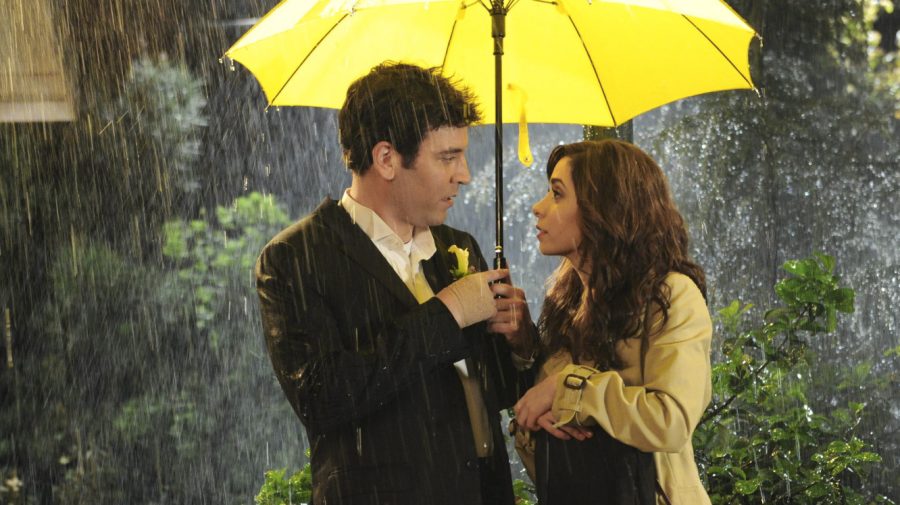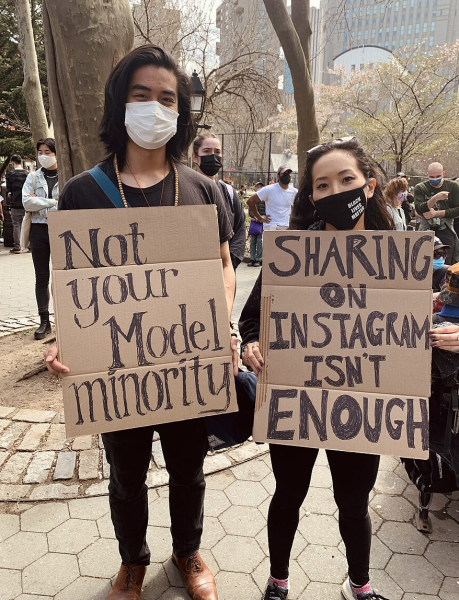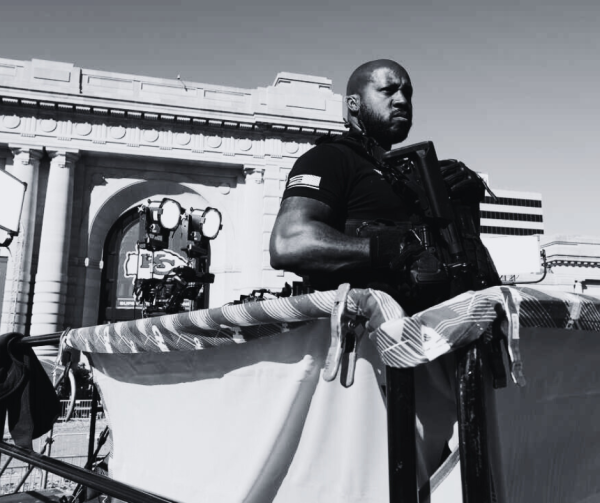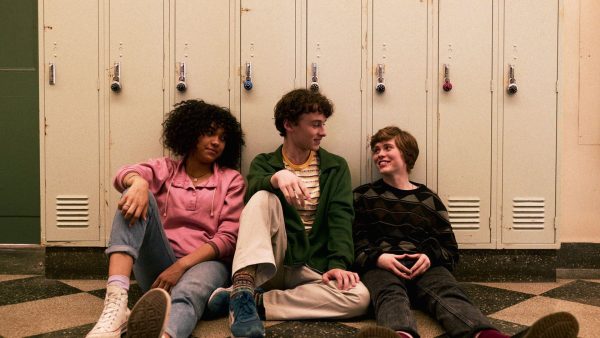The problem with romantic comedies
Rom-Coms: realistic forms of love, or Hallmark’s money maker?
Photo courtesy of NPR.org (CBS)
The season finale of “How I Met Your Mother”
February 14, 2022
*Minor spoilers for “The Breakfast Club,” “How I Met Your Mother,” “How to Lose a Guy in 10 Days,” “10 Things I Hate About You,” and “The Proposal”*
Romantic comedies have long served as a comfort. They provide hope while enforcing harmful stereotypes and unattainable standards. Don’t get me wrong, I love romantic comedies (otherwise known as rom-coms) just as much as the next person, but increasing one’s awareness and not blindly wrapping oneself in these harmful and out-of-touch stories is a must. I, like many others, seek comfort in the predictable plot of how the guy “gets the girl,” but the term is inherently sexist. For too long, we have been passive when dealing with rom-coms.
The notion that one must “Change for their Man”
The most famous rom-coms have pushed the idea of the grand makeover. In the beginning, the main character is often seen as unattractive, often having glasses and bushy hair, but somehow, with straight hair, contacts, makeup and a whole new wardrobe, the protagonist is now seen as an adequate love interest. This is illustrated in “Clueless” when Tai, the new kid in town, is approached by Cher and Dionne with the offer to make her over and be her friend. The movie “She’s All That” is not innocent either, as exemplified by the bet made between Zack and his friends to make the ‘nerdy outcast’ Laney Boggs, who is originally seen as ugly, the prom queen. And despite being more of a teen drama, this can also be seen in “The Breakfast Club” when ‘the princess’ Claire makes the ‘oddball’ Allison swap out her black clothing and personality for a pink dress.
Of course, it is wonderful for women to have depth and to express themselves in different ways, but the style change was not made for that reason. Ally Sheedy, the actress who portrayed Allison, fought John Hughes in this scene. She has since stated, “Listen, it was Hollywood in the Eighties. They wanted to take the ugly duckling and make her into a swan” and on another occasion, that “it was one of those things, though. It was the ’80s, and [they had] to take this young woman who seems like a crazy person and make her into, you know, somebody pretty or whatever it was.” After her makeover, Allison gets together with Andrew, who only sees her as a viable girlfriend after she becomes more like the beauty stereotype (Claire) and less like the recluse she originally presented as. The concept of ‘changing for your man’ feeds into the male fantasy of being the creator of a woman.
The notion of “Preordained Love”
Romantic comedies center around the assumption that we are meant to end up with someone. There is even a whole movie focused on this idea called “Serendipity,” in which the main love interests, Jonathan and Sara, find love at first sight, but after 10 years and with 3,000 miles between them, they wait to see what fate has in store for them. Yes, there is comfort in believing this, but as stated by Eve in “Serendipity,” “it is a wonderful thought, the idea that all of life, that every single event is part of some master plan designed to lead us to our universal soulmate. But if that’s really true what’s the point of living?” The idea of preordained love renders our actions in life unnecessary. If we focus on destiny, we are passively waiting for our romantic happiness to be handed to us. We waste the lives and time we have, which could possibly lead us to our own happiness on our own.
The notion that “Love is Conflict”
In movies and television shows, love is often depicted as pushing each other away. This can be displayed by couples on and off again and is seen in big movies such as “The Notebook” and also well-known television shows such as “Friends.” These situations perpetuate the idea that romance is resistance. It plants the idea that the on and off again that eventually leads to the main protagonists getting together are necessary and justified parts of a relationship (while the fights being displayed are over minuscule problems). Romantic comedies elusively teach us that if a guy pushes you away, it means he cares and isn’t ready for how much he cares about you. It conditions us to believe that relationships should be full of constant fighting. Excessive dramatization and ignoring red flags result in unhealthy relationships.
The notion of the “Unattainable Man”
In romantic comedies, men are often portrayed as players with commitment issues who somehow change into the perfect boyfriend once a girl comes around. This can be seen in “How I Met Your Mother” through how Barney, the notorious womanizer who throughout the whole series looks down on marriage, becomes a tamed, ready to settle down, married man, by the end of the series. Additionally, in “How to Lose a Guy in 10 Days,” Ben is so confident in his romantic prowess due to the numerous romantic conquests that he bets he can make any woman fall in love with him in 10 days. Somehow, by the end of the movie, he lives happily ever after and “gets the girl.”
The “Power of Big Gestures”
In romantic comedies, big gestures mean you have to forgive big mess-ups. From Lloyd Dobler with a boombox outside Diane Court’s window in “Say Anything” to Mark and his cue cards outside Juliet’s house in “Love Actually.” Somehow, holding a boombox outside your ex-girlfriend’s window the day after she breaks up with you is not creepy and actually works as displayed in “Say Anything.” Additionally, although if singularly viewed, the cue card scene in “Love Actually” could come off as romantic and sweet, it is quite the opposite. In the real situation, Mark is in love with Juliet and, as a result, treats her like crap. Juliet is engaged to and then married to Mark’s best friend, Peter. Mark messes up Peter and Juliet’s wedding video by zooming in stalkerish on Juliet. Mark later shows up at Peter and Juliet’s house to confess his love, CD player, and cue cards in hand. He proceeds to confess his love to his best friend’s wife.
The notion that “Stalking is Romance”
To add to that, stalking and creepy behavior have been universally accepted as vessels of romance in romantic comedies. The thing is, this isn’t romantic, but because it is a movie that is full of good-looking people, we are okay with it. For example, take “The Notebook.” We see it as romantic, but someone hanging from a Ferris wheel and threatening to let go unless you agree to a date is an immediate red flag, and if it wasn’t Ryan Gosling who did it, we probably would be creeped out and call the police. The consensus seems to be that if we like someone, their crazy behavior is endearing, but if they are not desirable, they are judged harshly. In “How I Met Your Mother,” a sitcom that includes rom-com elements, the protagonist Ted states that “If both people are into each other, a big romantic gesture works: like Lloyd Dobler, holding up the boombox outside Diane Court’s window in “Say Anything.” But, if one person isn’t into the other, the same gesture comes off serial-killer crazy.” Movies give us fantasies of relationships with semi-abusive guys. A well-known example of this is portrayed by Bella and Edwards’ relationship in Twilight, with Edward even explicitly stating, “I can’t ever lose control of you.”
The notion that “Women Need to be Chased”
The plot of romantic comedies often depicts a man repeatedly approaching a woman who rejects his advances, only to be won over in the end. This is problematic for obvious reasons. Men wear women down until they have no choice but to give in. It is as if a certain kind of no means trying a few more times. This can be seen in well-known movies such as “10 Things I Hate About You,” through how, after repeated approaches, Kat finally gives in to Patrick. This also reveals a double standard, since men who don’t like to be chased are told that if a woman makes too great a gesture, she is less like Gosling and more like a fatal attraction.
The notion that “Cuteness Exempts Guilt”
The main female protagonist is presented as a cute character that can do no wrong, so when they do wrong, their guilt is absolved. This can be seen by Annie flying across the country to see Sam, a complete stranger in “Sleepless in Seattle.” In “While You Were Sleeping,” Lucy lies about being the fiance of Peter, a man who was in a coma and woke up with ‘amnesia’. This can be seen by Julianne sabotaging her best friend Michael’s wedding because she realized she loved him too late in “My Best Friend’s Wedding.” We forgive everything in the end and rationalize it, despite many of the creepy, stalkerish and flat-out rude behaviors.
The “Nice Guy” Trope
Romantic comedies tend to include the self-proclaimed “nice guy,” who is often not nice at all. The trope implies that if a man tries hard enough, he will be ‘rewarded with the girl’. This nice guy is embodied by Leonard from “The Big Bang Theory,” Ross from “Friends,” and Ted from “How I Met Your Mother.” Any bad that he does is excused by his ‘trustworthiness’ and history of ‘niceness’. Basing one’s personality on one’s niceness is not attractive and, in turn, is a red flag.
The “Overlooked Best Friend” – The “Friends to Lovers” Trope
Romantic comedies have a whole sub-genre predicated on the idea that we never realize that we are in love with our best friend. The thing is, there is a reason we ignore that friend. It is because we are not attracted to them. Although not as problematic as other reasons, this trope leads one to second-guess oneself.
The notion that women need to be “Tamed”
As famously shown in “10 Things I Hate About You,” a modern spin on Shakespeare’s “The Taming of the Shrew,” the ‘uptight and wild’ female protagonist Kat is tamed by the male protagonist Patrick by the end of the film. The same can be seen in “The Proposal,” in which career-driven Margaret is tamed by Andrew. This shows that any independent or career-driven woman must be tamed by the end of the movie. It says that she can still be smart, but she must soften her edges and realize that romance is what matters in life.
The problem of a clear lack of diversity
Romantic comedies lack diversity, and even when POC are in the movie, they usually portray secondary characters if they are in the movie at all. The protagonists tend to always be played by hot white people, with the women being clumsy enough to be seen as relatable and not too perfect. Additionally, famous romantic comedies tend to be about heterosexual relationships, although there has been representation in movies such as “Love, Simon.”
The notion that “Pre-Existing Relationships Do Not Matter”
Romantic comedies often say that it is okay to leave someone, cheat on someone or break someone’s relationship up if you are in love with them, which it isn’t. You have no right to ruin someone’s life. If they are happy, let them be happy. They are not responsible for your feelings. The “other person” is always personality-less, which allows us to rationalize the protagonist’s cheating/leaving them to be with their “true love” or “soul mate,” also known as the male protagonist. The movie “My Best Friend’s Wedding” makes fun of this assumption when Julianne doesn’t get the guy and proves a terrible friend for trying to mess up her best friend Michael’s marriage. This can be seen in the scene in the movie when Kimberly, Michael’s fiancee, calls Julianne out on her messed-up behavior.
The notion that “the Happy Ending Justifies the Means”
The journeys of romantic comedies compile mountains of lies, betrayals and manipulation. Nonetheless, the protagonists end up together, and all is absolved by the jubilant happily ever after. This is simply unrealistic. We have to ask if, after all that has happened, the relationship would even exist in the end to justify it. Could all the bad that had to happen ever justify the good that it led to? And what about the thoughts and memories of the meanings that still exist and lurk just below the surface, waiting to disrupt the happiness? Humans are vengeful creatures by nature. We hold grudges. Real relationships could never withstand the dramatized ordeals put forth in romantic comedies.












